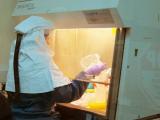Sep 9, 2008 (CIDRAP News) – Members of Congress plan to press the FBI for more information about its investigation of the 2001 anthrax attacks at hearings scheduled Sep 16 and 17, amid persistent doubts in some quarters about the bureau's conclusion that the late microbiologist Dr. Bruce Ivins was the culprit.
Ivins, who had worked for years at the US Army Research Institute of Infectious Diseases (USAMRIID) in Frederick, Md., committed suicide Jul 29 as the FBI was about to bring charges against him. Five people died and 17 others became ill after envelopes containing anthrax spores were mailed to two senators and several news media offices in the fall of 2001.
The FBI announced its conclusions about Ivins's role and released a collection of documents on Aug 6. Besides citing considerable circumstantial evidence, the agency asserted that a new DNA fingerprinting technique had enabled investigators to match the letter anthrax to a batch of anthrax that was in Ivins's custody at USAMRIID. But many observers subsequently expressed doubts about the FBI's case.
In a Sep 5 letter to FBI Director Robert S. Mueller III, leaders of the House Judiciary Committee said, "Important and lingering questions remain that are crucial for you to address, especially since there will never be a trial to examine the facts of the case."
The committee members, including Chairman John Conyers Jr., D-Mich., asked Mueller to report back to them on several questions in advance of the hearing, scheduled Sep 16. The committee asked:
- Why government scientist Steven Hatfill remained a suspect in the attacks for a long time, "in light of the evidence clearly pointing elsewhere"
- Why the government allowed Ivins to keep his security clearance at USAMRIID for about 2 years after he became a suspect
- Whether mistakes by the FBI delayed the linkage of the anthrax used in the attacks with anthrax in Ivins' possession
The committee leaders also asked Mueller to explain media reports that the White House initially had pressed the FBI to say that the anthrax attacks were perpetrated by al Qaida or that the anthrax used was of a "weapons grade," implying a possible link to Iraq.
The Senate Judiciary Committee also will question Mueller at an FBI oversight hearing set for Sep 17. The hearing was scheduled weeks ago as part of an ongoing series, but Mueller is likely to face questions about the anthrax probe, according to a Sep 7 New York Times report.
"There are some very serious questions that have yet to be answered and need to be made public," said Sen. Arlen Specter, R-Pa., ranking Republican on the Senate committee, as quoted by the Times.
The Times story, based on interviews with two dozen bioterrorism experts, veteran investigators, and members of Congress, along with FBI documents, included some new details about the investigation.
For example, it said the agency told Ivins in a formal letter in April 2007 that he was not a target of the investigation, even though the mailed anthrax had already been genetically linked to his laboratory. Also, the story said the first time agents took a mouth swab from Ivins for a DNA sample was only a week before he died.
John Miller, the FBI's assistant director for public affairs, told the Times that the bureau plans to release much more information on the case, including notes of interviews with Ivins and other suspects and witnesses and surveillance logs detailing his movements. But because private and classified information must be purged from the materials, the disclosures are likely to be months away, the story said.
Ivins's attorney, Paul F. Kemp, said the FBI has not reviewed three boxes of papers that Ivins had marked for Kemp's attention, because the records must be reviewed to determine if they should be kept secret under attorney-client privilege, the Times reported. A government lawyer not involved in the investigation will review the papers with Kemp, the story said.
See also:
House Judiciary Committee letter to FBI
Aug 15 CIDRAP News story "FBI conclusions in anthrax probe meet skepticism"



















